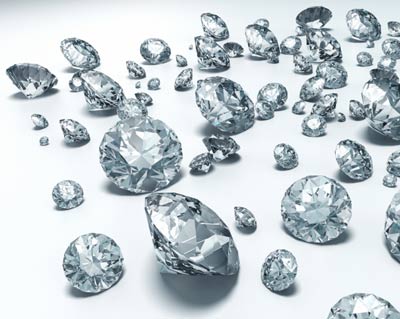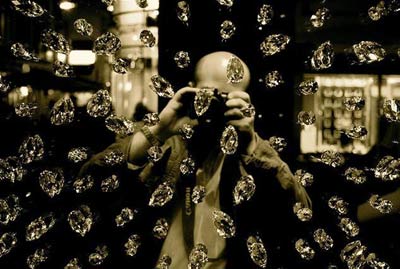在许多学者的眼里,钻石是缺乏精妙之美的庸俗商品,它的流行,是商家狡诈宣传和消费者盲目跟风的结果。然而,在我眼里,它却是自然的神奇和人类智慧的结晶,这代表着闪烁和永恒的爱物让我意识到:我们在人世间的旅程极其短暂,且终将归于碳尘。

By Paula Marantz Cohen
林安娜 选注
Although I have always considered myself a fairly unconventional person, I wanted a diamond ring when I became engaged to be married.[2] To please me, my fiancé visited the Diamond District in New York City and (with the help of his mother) picked out a round, 1.5-carat diamond with a yellow gold band.[3]
In the early years of my marriage, some of my female students would come up to me after class and compliment[4] me on my ring. I don’t know if it was the diamond they were admiring or the fact that I had managed to get myself married. In time, the compliments diminished.[5] Whether because my ring was less impressive or because marriage seemed less of an accomplishment[6] to the new generation is hard to say.
As with all highly prized commodities, diamonds also have their detractors.[7] A few years ago, a man sitting next to me at a faculty lunch proclaimed in a loud voice,[8] “That is the biggest diamond I’ve ever seen!” Everyone at the table turned to stare, and my academic stock immediately sunk.[9] My diamond is hardly enormous; in another setting, say dinner at Mayor Bloomberg’s or Warren Buffett’s, it would be puny—but in an academic setting, it looms large and vulgar.[10] Even esthetic-minded academics see diamonds as philistine commodities lacking in nuance.[11] This is not really true, since accurate assessment of the four Cs—color, cut, clarity, and carat weight—requires immense study; it’s just that this study is different from the study for attendance at another four Cs (the Conference on College Composition and Communication).[12] Diamonds also get a bad rap in academia in being linked to marriage, that most bourgeois of institutions.[13] I know that my diamond ring goes against the grain of my profession[14], but I don’t care. I like the mild vulgarity[15] of the thing.

The idea of wearing a diamond on one’s finger is, when one thinks about it, absurd. But, then, all ornament[16] is absurd. My husband, who does not understand jewelry, connects it to the mystery of gender difference[17]. He thinks there is something hormonal in the desire to display a mutated piece of carbon on one’s finger.[18] His theory misses the fact that many men have a taste for diamonds.
As I see it, diamonds reconcile in the simplest possible way two elements that appeal to us—the glittery fun of bling and the solidity of a good investment.[19] These are also the two attributes[20] we seek in marriage and, indeed, in life. A diamond, by symbolically denoting brightness and endurance, reminds us of the fact that our passage through this mortal space is fleeting and will inevitably end in (carbon) dust.[21]
Vocabulary
1. sparkly: 活泼的,生气勃勃的。
2. unconventional: 不守成规的,不依惯例的;engaged: 订婚的。
3. fiancé: 未婚夫,未婚妻为fiancée;1.5-carat diamond with a yellow gold band: 黄金戒圈的1.5克拉钻戒,克拉为钻石等珠宝的重量单位,等于200毫克。
4. compliment: 赞美,恭维。
5. in time: 一段时间之后;diminish: 减少,缩减。
6. accomplishment: 成绩,成就。
7. prized commodity: 价格高昂的商品; detractor: 诋毁者,贬低者。
8. faculty lunch: 教工午餐;proclaim: 宣告,宣布。
9. my academic stock immediately sunk: 我的学术地位立时陡降。stock: 声望,地位。
10. 我的这颗钻石算不上很大,在其他场合,比如布隆伯格市长或是巴菲特的晚宴上,可能都无足挂齿。但在学术场合,它却赫然突显,庸俗不堪。Mayor Bloomberg: 布隆伯格(Michael R. Bloomberg),纽约市长,传媒大亨;Warren Buffett: 沃伦•巴菲特,著名投资商、慈善家,有“华尔街股神”之称;puny: 微不足道的。
11. 即便是颇具审美趣味的学者,也会将钻石视作缺乏精妙之美的庸俗商品。
12. 这有悖事实。对4C(颜色、切工、净度和克拉数)的精密测量需要大量研究,只不过这种研究有别于参与另外一项4C(大学写作与交流会议)的研究。
13. rap: 批评,指责;academia: 学术圈;that most bourgeois of institutions: 最平庸的习俗。
14. grain of my profession: 我职业的特质。
15. vulgarity: 粗俗。
16. ornament: 装饰(品)。
17. gender difference: 两性差异。
18. hormonal:(似)激素的,激素引起的;a mutated piece of carbon:(钻石是)碳的同素异形体。
19. 我认为,钻石用最简单的方法把吸引我们的两个因素调和起来:一个是闪闪亮带来的乐趣,另一个是好投资所保证的可靠。
20. attribute: 特征。
21. 钻石代表了闪烁和永恒,它让我们意识到这样一个事实:我们在人世间的这段旅程极其短暂,且终将归于(碳)尘。
(来源:英语学习杂志)